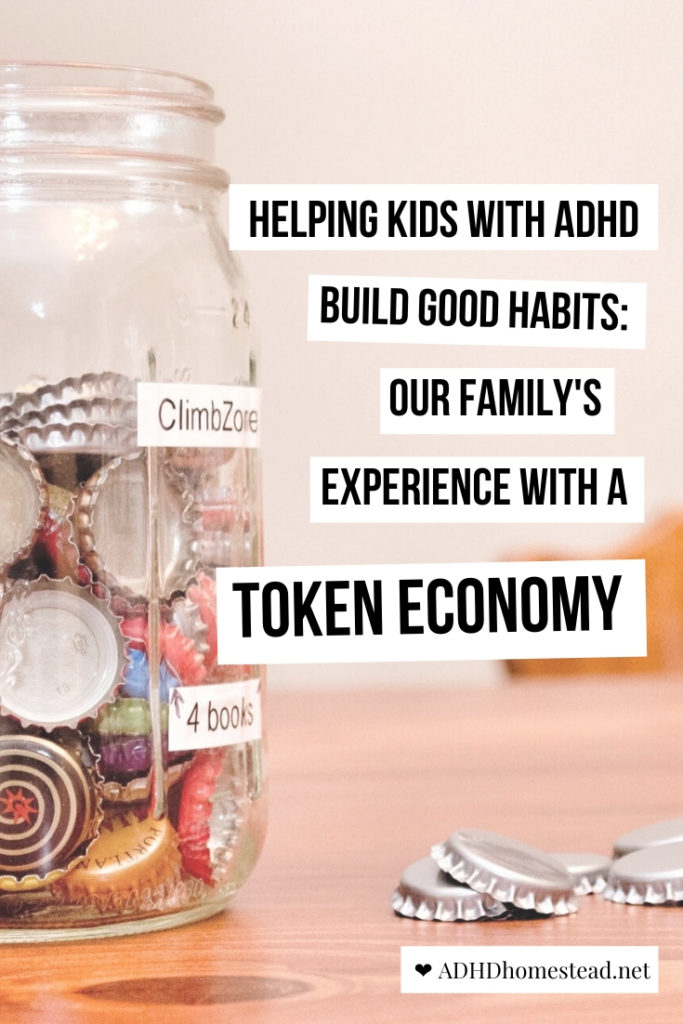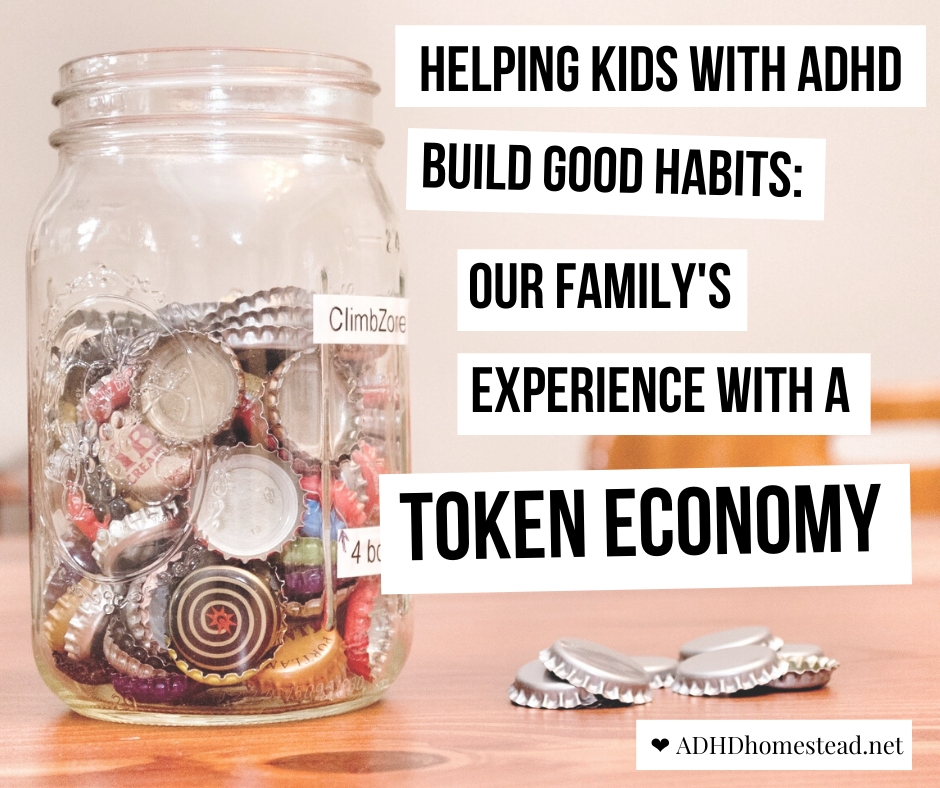ADHDers of all ages struggle to troubleshoot problem behaviors and develop good habits. Parents can have an especially hard time helping kids with this while barely muddling through ourselves. We recently tried a new strategy with our six-year-old. I’ve written before that I prefer intrinsic motivation and natural consequences. However, parents of kiddos with ADHD will tell you: those don’t always cut it. So I, a self-proclaimed hater of sticker charts and reward systems, had to have a little reckoning with reality.
No, I did not create a sticker chart. I created a token economy. Token economies still use external rewards, but the science seems to support them and my kid’s therapist suggested I try it. To my surprise, our family learned a heck of a lot.

What is a token economy?
A token economy is a system of positive reinforcement. Its subjects receive tokens in exchange for performing desired behaviors1. You can implement one with your child as follows:
- Define up to three target behaviors/habits.
- They should be clear and specific, e.g. “Clear place after finishing a meal” or “empty school bag and hang up before dinner”
- Avoid subjective or vague goals like “use good table manners” or “be nice to siblings”
- Avoid negative targets like “don’t chew with mouth open”
- Define rewards your kiddo will work toward while practicing these behaviors.
- Should be something they wouldn’t get otherwise, such as:
- Extra screen time
- A special outing or activity
- Small treat or toy
- Day off from regular chores
- New privilege (e.g. sleepover with a friend)
- Determine ahead of time how many tokens each item will cost
- Include some big, some medium, some small rewards
- Child can choose to redeem some immediately or save up for a larger reward
- Should be something they wouldn’t get otherwise, such as:
- Designate small tangible objects to use as tokens.
- Should be a thing the kiddo can see and hold, something that takes up space
- Buttons, marbles, poker chips, bottle caps, etc. all work well (we used bottle caps)
- Can also use stickers
- Award a token immediately after each instance of desired behavior.
- Allow your kiddo to redeem tokens for the rewards you decided on in Step 2.
A token economy blends immediate gratification — earning a token for demonstrating a target behavior — with long-term rewards and habit formation. It adds a tangible element to verbal praise like “thank you for clearing your place after breakfast.” It also incentivizes good behavior over time. While your child earns a token immediately for doing the right thing, they need to repeat it many times to earn a desired reward.
I hate the idea of bribing kids for good behavior
When my son’s therapist suggested a token economy to me, I didn’t want to do it. It smacked of buying good behavior — something that really grinds my gears.
Sticker charts, candy at the end of a shopping trip, paying allowance money for everyday chores: you name it, I hate it. Call me old-fashioned, superior, or straight-up impractical and unreasonable. I won’t argue with you.
I’ve also insisted from Day One that I would promote natural, logical consequences with my kid. That meant none of the punishments I found so unhelpful as a child: I got a lot of the standard-issue “no video games for a week!” when I crossed a line with my parents. It also meant no artificial reward systems.
Yes, I’m an avowed killjoy, but the idea of transactional relationships in a family makes me uncomfortable. When one of us asks for help, whether it’s with setting the dinner table or picking up milk on the way home from work, the default answer should be “yes.” Families help each other. We’re a team. We don’t ask “what’s in it for me?” before agreeing to do something.
One of my biggest goals for my child is for him to be intrinsically motivated. He should help because he feels uncomfortable sitting on his rump while others are working. If he breaks my trust by violating a boundary, the consequence should be directly tied to that boundary. Arbitrary consequences — both good and bad — won’t teach him how to do better next time.
At the same time, all relationships have transactional elements
My sanctimony on this topic obscured an important point: we all bring transactional elements to our relationships. It helps us keep things in balance. One year my neighbor asked me to do a photo shoot with her kids for her Christmas card pictures. In return, she offered to have our family over for a home-cooked meal.
I love this sort of exchange: it lubricates the gears of community. People like to feel needed, but not put out. The right balance will make each member of the group feel both uniquely valued and free to ask a favor for themselves once in a while.
Many of the behaviors and habits I ask my son to develop feel more important to me than to him, at least at first. Sure, I want him to set the table and put away his laundry because he feels intrinsically motivated to do so. I want him to innately possess the self-regulation to stay in his area and complete his work at school. However, none of these are intrinsically rewarding or exciting for him. He may not even get a reward for some of them — just the absence of a negative like nagging, scolding, or a trip to the principal’s office.
His therapist pointed out that while we’re working on these skills and habits, it’s okay to provide external scaffolding. And don’t I provide myself similar scaffolding, in the form of my habit hearts? I don’t form good habits without a tangible record or reward — and I (supposedly) have a fully-developed prefrontal cortex. With this in mind, I decided to give the token economy a try.
Token economy, month one: our family’s biggest takeaways
Kids with ADHD are not incapable
I shouldn’t need to say this, but how many adults with ADHD say it about ourselves? We assume our ADHD means we have to expect less — and others should expect less. Certain life skills are just beyond us. Whether we mean to or not, we transfer this mindset to our children.
Before we started the token economy, my husband told me it wouldn’t help. He claimed our son was fundamentally incapable of sustaining focus or choosing to do something necessary over something fun or interesting. The prospect of earning tokens wouldn’t help him any more than the prospect of avoiding negative consequences.
I insisted we give it a try anyway.
To our surprise, the kiddo made dramatic improvements in areas where he’d struggled for years. I suspect a combination of factors behind this. The token economy broke goals down into their smallest component parts, kind of like Mini Habits. It also helped me stay focused our agreed-upon priorities instead of nagging and correcting every little thing. This may have made things seem possible for him where he previously wouldn’t have known where to start.
The tokens also worked another magic, one that ADHDers feel especially keenly. They transformed positive reinforcement from something abstract and fleeting to something tangible and persistent.
Time blindness: once earned, tokens can never be lost
My son is sensitive, big-hearted, and he loves to make others happy. When he gets in trouble or makes a mistake, he feels it deeply. His behavior usually gets worse with negative consequences like time-outs, or even me getting angry with him.
I’ve long suspected time blindness as an underlying culprit here. He can’t yet put these setbacks in perspective. The token economy provides objectivity and consistency, regardless of anyone’s emotional state.
One night when he was having a particularly tough time, I dragged my son down to the kitchen and told him to look at his token jar. “They’re all still there,” I said. “All the good, everything you’ve done right, is always there. Nothing can take it away.”
Bad days can feel all-consuming. A jar of earned tokens provides a physical reminder that nothing can take away the good we’ve already done.
I need self-regulation tools as a parent, too
In addition to providing a physical reminder of his success, the token economy has shielded my kid from the effects of my ADHD. I can be time-blind, too. I lose track of the big picture.
None of us can work on all our issues at once. It’s too overwhelming. As a parent, that means I shouldn’t raise every issue I see, every day. This requires impulse control and emotional regulation — two things ADHDers often find in short supply.
We’ve had a lot of success narrowing the scope. He’s done well focusing on a few habits per week. However, this success has depended on my support in other areas. Some weeks, me yelling at him to hang up his backpack and coat after school will feel like too much. If it’s not one of our priorities, I need to let it go and trust we’ll get there eventually. He’s already reminded me of this several times.
Sometimes you just have to give it a try
I never expected the token economy to teach us these lessons. My husband didn’t even think it was worth trying. It’s easy for people with ADHD to give up before we start — to say, “that probably won’t work for me.” Most of us have plenty of examples to back this up and think those examples ought to give us a pass.
I’m glad I tried the token economy. I was at my wits’ end with my kiddo. He and I go through ups and downs. His therapist suggested the token economy in a pretty big down. My husband was tired of trying to get through to him, I was getting bad reports about his behavior at school, and the poor soul seemed angry all the time. The last thing I wanted was for someone to ask me the equivalent of, “have you tried a sticker chart? That worked wonders for my kid.”
Part of my brain wanted to write off the token economy as just that: a glorified sticker chart. I gave it a go only because I wanted to report back to the therapist that I’d tried. I would feel ashamed to tell her I’d taken no action whatsoever. So I set some goals with my kid and waited to see what happened. Little did I know, he’d surprise all of us.
If you’ve tried a token economy in your family, I’d love to hear about it! If you’re interested in learning more, here are a few resources:
- How to Create a Token Economy System to Improve Your Child’s Behavior | Very Well Family
- Token Economy | Educate Autism
- Token economy | Wikipedia
Hey there! Are you enjoying The ADHD Homestead?
Here's the thing: I don't like ads. I don't want to sell your attention to an advertising service run by the world's biggest data mining company. I also value my integrity and my readers' trust above all, which means I accept very few sponsorships/partnerships.
So I'm asking for your support directly. For the cost of one cup of coffee, you can help keep this site unbiased and ad-free.
Below you will find two buttons. The first lets you join our crew of Patreon pals and pledge monthly support for my work. Patrons also have access to my Audioblogs podcast. The second takes you to a simple donation page to pledge one-time or recurring support for The ADHD Homestead, no frills, no strings. Do whichever feels best for you!

